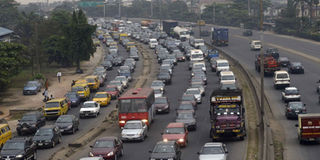Nigeria to become a global force by 2030: McKinsey

Motorists queue in a long traffic jam in Lagos on January 17, 2014. Nigeria is set to join the world's top 20 economies by the year 2030, thanks to a fast growing consumer base, the McKinsey Global Institute said in a report published on Thursday. AFP PHOTO/ PIUS UTOMI EKPEI
What you need to know:
- If the outlook is true then this means that Nigeria's economy will be bigger than that of Netherlands, Thailand, or Malaysia cementing Africa's role in world's geopolitical agenda.
- The African giant and largest oil producer with a population of about 170 million, has delivered growth rates of over 4 per cent for more than decade.
Nigeria is set to join the world's top 20 economies by the year 2030, thanks to a fast growing consumer base, the McKinsey Global Institute said in a report published on Thursday.
Africa's most populous country and now the continent's biggest economy whose current picture is tainted by terror attacks is expected to grow at a rate of 7.1 per cent annually to become a global force.
"Nigeria has the potential to expand its economy by roughly 7.1 per cent per year through 2030, raising GDP to more than $1.6 trillion in 2030, this could move Nigeria from being the 26th-largest economy today to a top-20 economy by 2030," said McKinsey.
If the outlook is true then this means that Nigeria's economy will be bigger than that of Netherlands, Thailand, or Malaysia cementing Africa's role in world's geopolitical agenda.
Standards of living
However, even though Nigeria's economy is the largest in Africa, the standards of living of its people remains far much below that of South Africa whose 2013 nominal GDP stands at $354 billion compared to Nigeria's $510 billion.
Most GDP growth is coming from beyond the resources sector, which is now just 14 per cent of GDP. However, historical weaknesses in the agricultural sector and a poorly functioning urbanisation process have prevented most Nigerians from benefiting from this growth.
The report ranks Kenya at position 10 in Africa by the size of the economy, however as much as Kenya is not a match to Nigeria, GDP is not a sufficient measure of a country's competitiveness.
The African giant and largest oil producer with a population of about 170 million, has delivered growth rates of over 4 per cent for more than decade.
"In addition, we estimate that nearly 120 million Nigerians could move above the Empowerment Line and 70 million could be lifted out of poverty if growth can be made more inclusive than it has been," report added.
Nigeria has a huge endowment of resources, a growing consuming class, and rapidly growing trade and consumer sectors to propel growth.
Nigeria this year rebased its economy to include sectors that were never accounted for in earlier statistics in a move that saw the size of its economy rise significantly dwarfing South Africa's numbers that have over time helped in pulling in foreign investors.
However analysts criticised Nigeria's move saying the rebasing exercise was done merely to pump up the image of the country and show that its greater than South Africa, an assertion that Nigeria's finance minister Dr Okonjo Ngozi Iweala refutes.





